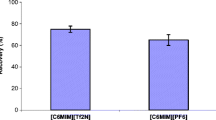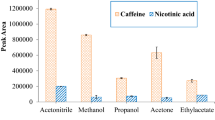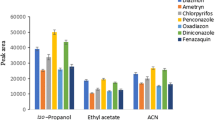Abstract
Salting-out assisted liquid-liquid extraction (SALLE) coupled to dispersive liquid-liquid microextraction (DLLME) was developed as an efficient extraction method for purification and preconcentration of bisphenol A and six analogs (B, E, F, S, BADGE, BFDGE) in canned coffee drinks. Ultra-performance liquid chromatography-tandem mass spectrometry was applied for the determination of the analytes. The parameters affecting the extraction efficiency in SALLE and DLLME procedures were investigated. Under optimum conditions, matrix-matched calibration curves were established using standard solution spiked canned coffee samples in the range of 0.5–50 μg kg−1 and limit of detections (LODs) were in the range of 0.01–0.1 μg kg−1. Recoveries obtained from spiked canned coffee samples at three concentration levels ranged from 70.3 to 98.3% and the relative standard deviations were lower than 8% for intra- (n = 3) and inter-day (n = 3) precisions at a concentration of 1.0 μg kg−1 of each analyte. The proposed method has the advantages of simple operation, low consumption of organic solvent, fast phase separation, high efficiency, and good selectivity. When applied to eight different brands of analyzed canned coffee samples, it showed good applicability for the determination of the analytes and BPA was detected in 7 out of 8 samples (87.5%). The proposed method was also compared with previous other methods.






Similar content being viewed by others
References
AlAmmari AM, Khan MR, Aqel A (2020) Trace identification of endocrine-disrupting bisphenol A in drinking water by solid-phase extraction and ultra-performance liquid chromatography-tandem mass spectrometry. J King Saud Univ Sci 32:1634–1640. https://doi.org/10.1016/j.jksus.2019.12.022
Bacle A, Thevenot S, Grignon C, Belmouaz M, Bauwens M, Teychene B, Venisse N, Migeot V, Dupuis A (2016) Determination of bisphenol A in water and the medical devices used in hemodialysis treatment. Int J Pharm 505:115–121. https://doi.org/10.1016/j.ijpharm.2016.03.003
Caballero-Casero N, Lunar L, Rubio S (2016) Analytical methods for the determination of mixtures of bisphenols and derivatives in human and environmental exposure sources and biological fluids. A review. Anal Chim Acta 908:22–53. https://doi.org/10.1016/j.aca.2015.12.034
Cacho JI, Campillo N, Viñas P, Hernández-Córdoba M (2012) Stir bar sorptive extraction coupled to gas chromatography-mass spectrometry for the determination of bisphenols in canned beverages and filling liquids of canned vegetables. J Chromatogr A 1247:146–153. https://doi.org/10.1016/j.chroma.2012.05.064
Cai Y, Cai Y, Shi Y, Liu J, Mou S, Lu Y (2007) A liquid-liquid extraction technique for phthalate esters with water-soluble organic solvents by adding inorganic salts. Microchim Acta 157:73–79. https://doi.org/10.1007/s00604-006-0625-7
Chen M-Y, Ike M, Fujita M (2002) Acute toxicity, mutagenicity, and estrogenicity of bisphenol-A and other bisphenols. Environ Toxicol 17:80–86. https://doi.org/10.1002/tox.10035
Cobellis L, Colacurci N, Trabucco E, Carpentiero C, Grumetto L (2009) Measurement of bisphenol A and bisphenol B levels in human blood sera from healthy and endometriotic women. Biomed Chromatogr 23:1186–1190. https://doi.org/10.1002/bmc.1241
Cunha SC, Almeida C, Mendes E, Fernandes JO (2011) Simultaneous determination of bisphenol A and bisphenol B in beverages and powdered infant formula by dispersive liquid-liquid micro-extraction and heart-cutting multidimensional gas chromatography-mass spectrometry. Food Addit Contam A 28:513–526. https://doi.org/10.1080/19440049.2010.542551
Dong H, Zeng X, Bai W (2018) Solid phase extraction with high polarity Carb/PSA as composite fillers prior to UPLC-MS/MS to determine six bisphenols and alkylphenols in trace level hotpot seasoning. Food Chem 258:206–213. https://doi.org/10.1016/j.foodchem.2018.03.074
EC (2005) Regulation no 1895/2005 of 18 November 2005 on the restriction of use of certain epoxy derivatives in materials and articles intended to come into contact with food. Off J Eur Union L 302:28–32
Gallart-Ayala H, Moyano E, Galceran MT (2011a) Analysis of bisphenols in soft drinks by on-line solid phase extraction fast liquid chromatography–tandem mass spectrometry. Anal Chim Acta 683:227–233. https://doi.org/10.1016/j.aca.2010.10.034
Gallart-Ayala H, Moyano E, Galceran MT (2011b) Fast liquid chromatography–tandem mass spectrometry for the analysis of bisphenol A-diglycidyl ether, bisphenol F-diglycidyl ether and their derivatives in canned food and beverages. J Chromatogr A 1218:1603–1610. https://doi.org/10.1016/j.chroma.2011.01.026
Gallo P, Pisciottano IDM, Esposito F, Fasano E, Scognamiglio G, Mita GD, Cirillo T (2017) Determination of BPA, BPB, BPF, BADGE and BFDGE in canned energy drinks by molecularly imprinted polymer cleaning up and UPLC with fluorescence detection. Food Chem 220:406–412. https://doi.org/10.1016/j.foodchem.2016.10.005
Geens T, Goeyens L, Covaci A (2011) Are potential sources for human exposure to bisphenol-A overlooked? Int J Hyg Environ Health 214:339–347. https://doi.org/10.1016/j.ijheh.2011.04.005
Goodson A, Summerfield W, Cooper I (2002) Survey of bisphenol A and bisphenol F in canned foods. Food Addit Contam 19:796–802. https://doi.org/10.1080/02652030210146837
Gure A, Lara FJ, Moreno-González D, Megersa N, del Olmo-Iruela M, García-Campaña AM (2014) Salting-out assisted liquid-liquid extraction combined with capillary HPLC for the determination of sulfonylurea herbicides in environmental water and banana juice samples. Talanta 127:51–58. https://doi.org/10.1016/j.talanta.2014.03.070
Hampl R, Kubátová J, Stárka L (2016) Steroids and endocrine disruptors-history, recent state of art and open questions. J Steroid Biochem 155:217–223. https://doi.org/10.1016/j.jsbmb.2014.04.013
Hoekstra EJ, Simoneau C (2013) Release of bisphenol A from polycarbonate-a review. Crit Rev Food Sci Nutr 53:386–402. https://doi.org/10.1080/10408398.2010.536919
Horie M, Yoshida T, Ishii R, Kobayashi S, Nakazawa H (1999) Determination of bisphenol A in canned drinks by LC/MS. Bunseki kagaku 48:579–587. https://doi.org/10.2116/bunsekikagaku.48.579
Hu X-Z, Wu J-H, Feng Y-Q (2010) Molecular complex-based dispersive liquid-liquid microextraction: analysis of polar compounds in aqueous solution. J Chromatogr A 1217:7010–7016. https://doi.org/10.1016/j.chroma.2010.09.013
Kabir ER, Rahman MS, Rahman I (2015) A review on endocrine disruptors and their possible impacts on human health. Environ Toxicol Pharmacol 40:241–258. https://doi.org/10.1016/j.etap.2015.06.009
Kang J-H, Kondo F (2002) Bisphenol A migration from cans containing coffee and caffeine. Food Addit Contam 19:886–890. https://doi.org/10.1080/02652030210147278
Khalil N, Ebert JR, Wang L, Belcher S, Lee M, Czerwinski SA, Kannan K (2014) Bisphenol A and cardiometabolic risk factors in obese children. Sci Total Environ 470-471:726–732. https://doi.org/10.1016/j.scitotenv.2013.09.088
Khan MR, Alammari AM, Aqel A, Azam M (2020) Trace analysis of environmental endocrine disrupting contaminant bisphenol A in canned, glass and polyethylene terephthalate plastic carbonated beverages of diverse flavors and origin. Food Sci Technol (Campinas) In press. https://doi.org/10.1590/fst.03420
Kitamura S, Suzuki T, Sanoh S, Kohta R, Jinno N, Sugihara K, Yoshihara S, Fujimoto N, Watanabe H, Ohta S (2005) Comparative study of the endocrine-disrupting activity of bisphenol A and 19 related compounds. Toxicol Sci 84:249–259. https://doi.org/10.1093/toxsci/kfi074
Li D, Zhou Z, Qing D, He Y, Wu T, Miao M, Wang J, Weng X, Ferber JR, Herrinton LJ, Zhu Q, Gao E, Checkoway H, Yuan W (2009) Occupational exposure to bisphenol-A (BPA) and the risk of self-reported male sexual dysfunction. Hum Reprod 25:519–527. https://doi.org/10.1093/humrep/dep381
Liao C, Kannan K (2013) Concentrations and profiles of bisphenol A and other bisphenol analogues in foodstuffs from the United States and their implications for human exposure. J Agric Food Chem 61:4655–4662. https://doi.org/10.1021/jf400445n
Liao C, Kannan K (2014) A survey of bisphenol A and other bisphenol analogues in foodstuffs from nine cities in China. Food Addit Contam A 31:319–329. https://doi.org/10.1080/19440049.2013.868611
Lim DS, Kwack SJ, Kim K-B, Kim HS, Lee BM (2009) Risk assessment of bisphenol A migrated from canned foods in Korea. J Toxicol Env Heal A 72:1327–1335. https://doi.org/10.1080/15287390903212444
López-Darias J, Germán-Hernández M, Pino V, Afonso AM (2010) Dispersive liquid–liquid microextraction versus single-drop microextraction for the determination of several endocrine-disrupting phenols from seawaters. Talanta 80:1611–1618. https://doi.org/10.1016/j.talanta.2009.09.057
Malik AK, Blasco C, Picó Y (2010) Liquid chromatography-mass spectrometry in food safety. J Chromatogr A 1217:4018–4040. https://doi.org/10.1016/j.chroma.2010.03.015
Mbundi L, Gallar-Ayala H, Khan MR, Barber JL, Losada S, Busquets R (2014) Chapter two - advances in the analysis of challenging food contaminants: nanoparticles, bisphenols, mycotoxins, and brominated flame retardants. In: Fishbein JC, Heilman JM (eds) Advances in molecular toxicology, vol 8. Elsevier, pp 35–105. https://doi.org/10.1016/B978-0-444-63406-1.00002-7
Oliveira-Neto JR, Rezende SG, de Fátima RC, Benjamin SR, Rocha ML, de Souza GE (2016) Electrochemical behavior and determination of major phenolic antioxidants in selected coffee samples. Food Chem 190:506–512. https://doi.org/10.1016/j.foodchem.2015.05.104
Regueiro J, Wenzl T (2015) Development and validation of a stable-isotope dilution liquid chromatography–tandem mass spectrometry method for the determination of bisphenols in ready-made meals. J Chromatogr A 1414:110–121. https://doi.org/10.1016/j.chroma.2015.08.037
Rezaee M, Assadi Y, Milani Hosseini M-R, Aghaee E, Ahmadi F, Berijani S (2006) Determination of organic compounds in water using dispersive liquid-liquid microextraction. J Chromatogr A 1116:1–9. https://doi.org/10.1016/j.chroma.2006.03.007, 1
Richter CA, Birnbaum LS, Farabollini F, Newbold RR, Rubin BS, Talsness CE, Vandenbergh JG, Walser-Kuntz DR, vom Saal FS (2007) In vivo effects of bisphenol A in laboratory rodent studies. Reprod Toxicol 24:199–224. https://doi.org/10.1016/j.reprotox.2007.06.004
Saraji M, Boroujeni MK (2014) Recent developments in dispersive liquid-liquid microextraction. Anal Bioanal Chem 406:2027–2066. https://doi.org/10.1007/s00216-013-7467-z
Satoh K, Ohyama K, Aoki N, Iida M, Nagai F (2004) Study on anti-androgenic effects of bisphenol a diglycidyl ether (BADGE), bisphenol F diglycidyl ether (BFDGE) and their derivatives using cells stably transfected with human androgen receptor, AR-EcoScreen. Food Chem Toxicol 42:983–993. https://doi.org/10.1016/j.fct.2004.02.011
Spietelun A, Marcinkowski Ł, de la Guardia M, Namieśnik J (2014) Green aspects, developments and perspectives of liquid phase microextraction techniques. Talanta 119:34–45. https://doi.org/10.1016/j.talanta.2013.10.050
Sulyok M, Berthiller F, Krska R, Schuhmacher R (2006) Development and validation of a liquid chromatography/tandem mass spectrometric method for the determination of 39 mycotoxins in wheat and maize. Rapid Commun Mass Spectrom 20:2649–2659. https://doi.org/10.1002/rcm.2640
Troncoso B, Mushtaq I, Muneer A (2015) Environmental exposure to endocrine disruptors: can we identify the link with genital disorders? Eur Urol 68:1031–1032. https://doi.org/10.1016/j.eururo.2015.08.024
Ulutaş OK, Yıldız N, Durmaz E, Ahbab MA, Barlas N, Çok İ (2011) An in vivo assessment of the genotoxic potential of bisphenol A and 4-tert-octylphenol in rats. Arch Toxicol 85:995–1001. https://doi.org/10.1007/s00204-010-0620-y
Vela-Soria F, Ballesteros O, Zafra-Gómez A, Ballesteros L, Navalón A (2014) UHPLC-MS/MS method for the determination of bisphenol A and its chlorinated derivatives, bisphenol S, parabens, and benzophenones in human urine samples. Anal Bioanal Chem 406:3773–3785. https://doi.org/10.1007/s00216-014-7785-9
Viñas P, Campillo N, López-García I, Hernández-Córdoba M (2014) Dispersive liquid–liquid microextraction in food analysis. A critical review. Anal Bioanal Chem 406:2067–2099. https://doi.org/10.1007/s00216-013-7344-9
Xian Y, Wu Y, Dong H, Guo X, Wang B, Wang L (2017) Dispersive micro solid phase extraction (DMSPE) using polymer anion exchange (PAX) as the sorbent followed by UPLC–MS/MS for the rapid determination of four bisphenols in commercial edible oils. J Chromatogr A 1517:35–43. https://doi.org/10.1016/j.chroma.2017.08.067
Yeo M, Patisaul H, Liedtke W (2013) Decoding the language of epigenetics during neural development is key for understanding development as well as developmental neurotoxicity. Epigenetics 8:1128–1132. https://doi.org/10.4161/epi.26406
Yoshihara S, Mizutare T, Makishima M, Suzuki N, Fujimoto N, Igarashi K, Ohta S (2004) Potent estrogenic metabolites of bisphenol A and Bisphenol B formed by rat liver S9 fraction: their structures and estrogenic potency. Toxicol Sci 78:50–59. https://doi.org/10.1093/toxsci/kfh047
Zhang J, Wu H, Kim E, El-Shourbagy TA (2009) Salting-out assisted liquid/liquid extraction with acetonitrile: a new high throughput sample preparation technique for good laboratory practice bioanalysis using liquid chromatography–mass spectrometry. Biomed Chromatogr 23:419–425. https://doi.org/10.1002/bmc.1135
Zhang X, Chang H, Wiseman S, He Y, Higley E, Jones P, Wong CKC, al-Khedhairy A, Giesy JP, Hecker M (2011) Bisphenol A disrupts steroidogenesis in human H295R cells. Toxicol Sci 121:320–327. https://doi.org/10.1093/toxsci/kfr061
Zhou Y, Chen M, Zhao F, Mu D, Zhang Z, Hu J (2015) Ubiquitous occurrence of chlorinated byproducts of bisphenol A and nonylphenol in bleached food contacting papers and their implications for human exposure. Environ Sci Technol 49:7218–7226. https://doi.org/10.1021/acs.est.5b00831
Funding
This study was funded by the Project of Food and Drug Administration of Zhejiang Province of China (No. 2018005, No. 20190338) and the Science and Technology Planning Project of Huzhou of China (No. 2017GY10).
Author information
Authors and Affiliations
Corresponding author
Ethics declarations
Conflict of Interest
Dong-xu Wang declares that he has no conflict of interest.
Xin-cai Wang declares that he has no conflict of interest.
Qi-jie Hu declares that he has no conflict of interest.
Cheng-xian Zhang declares that he has no conflict of interest.
Fen Li declares that she has no conflict of interest.
Feng-li Wang declares that she has no conflict of interest.
Qiu-fang Feng declares that she has no conflict of interest.
Ethics Approval
This article does not contain any studies with human participants or animals performed by any of the authors.
Informed Consent
Not applicable.
Additional information
Publisher’s Note
Springer Nature remains neutral with regard to jurisdictional claims in published maps and institutional affiliations.
Rights and permissions
About this article
Cite this article
Wang, Dx., Wang, Xc., Hu, Qj. et al. Salting-Out Assisted Liquid-Liquid Extraction Coupled to Dispersive Liquid-Liquid Microextraction for the Determination of Bisphenol A and Six Analogs (B, E, F, S, BADGE, BFDGE) in Canned Coffee Drinks by Ultra-Performance Liquid Chromatography-Tandem Mass Spectrometry. Food Anal. Methods 14, 441–452 (2021). https://doi.org/10.1007/s12161-020-01879-0
Received:
Accepted:
Published:
Issue Date:
DOI: https://doi.org/10.1007/s12161-020-01879-0




